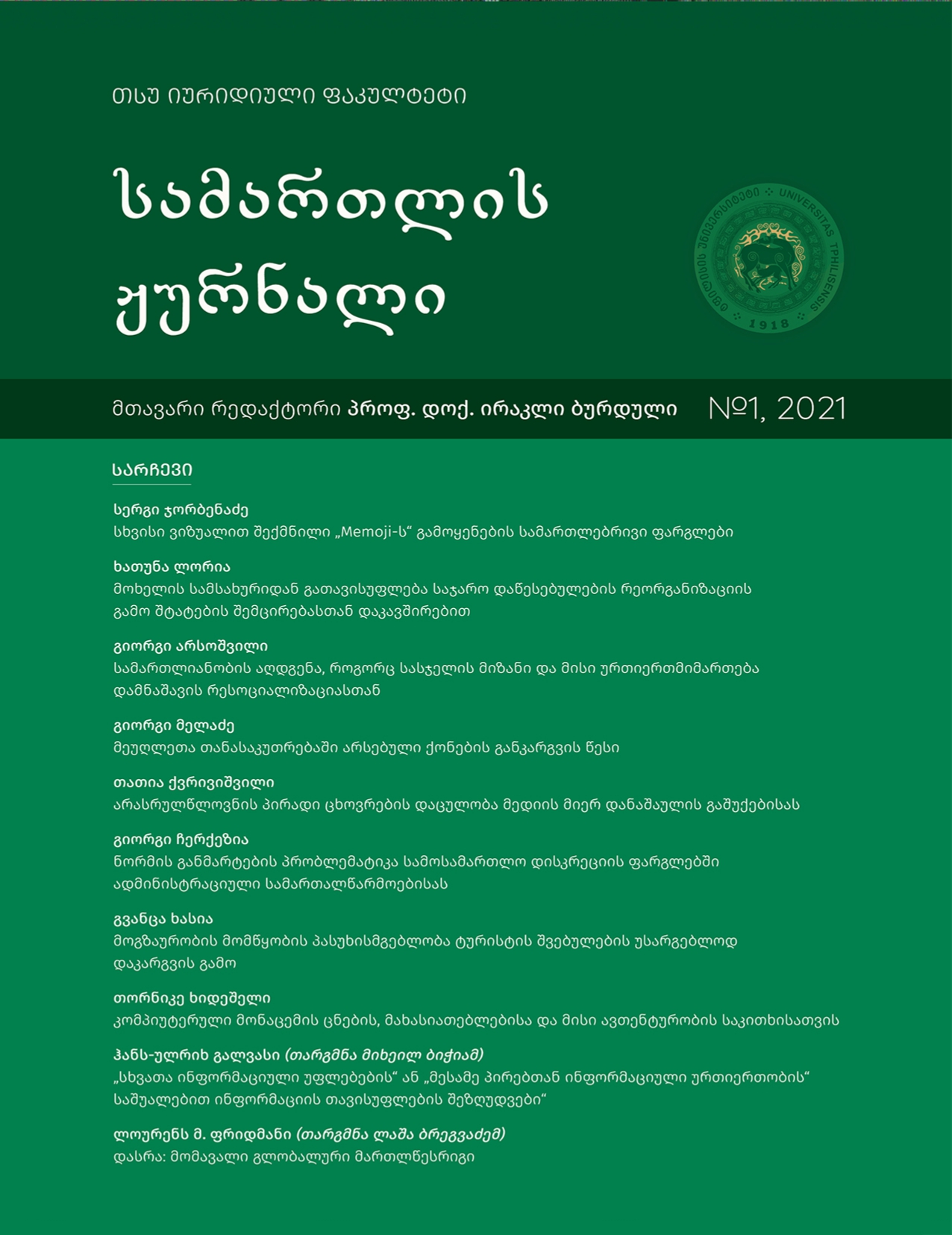კომპიუტერული მონაცემის ცნების, მახასიათებლებისა და მისი ავთენტურობის საკითხისათვის
DOI:
https://doi.org/10.60131/jlaw.1.2021.3355საკვანძო სიტყვები:
კომპიუტერული მონაცემი, კომპიუტერული სისტემა, ციფრული მტკიცებულება, ელექტრონული მტკიცებულება, კომპიუტერული მონაცემის ავთენტურობა.ანოტაცია
ნაშრომი ეხება ისეთ აქტუალურ საკითხს, როგორიცაა კომპიუტერული მონაცემი და მისი გამოყენება სისხლის სამართლის პროცესში. მოცემულობას, რომელიც სრულებით განსხვავდება ტრადიციული მტკიცებულებისგან და მისი სპეციფიკური და ტექნიკური მახასიათებლებიდან გამომდინარე, მნიშვნელოვან გამოწვევად იქცა იურიდიული საზოგადოებისათვის. რთული აღმოჩნდა მისი შინაარსობრივი მხარის გაგება, მატერიალურ და ელექტრონულ დოკუმენტს შორის არსებული სხვაობის წარმოჩენა და ელექტრონული სახით არსებული ინფორმაციის ავთენტურობის განსაზღვრა. შესაბამისად, ნაშრომის მიზანს კომპიუტერული მონაცემის შინაარსობრივი მხარის კვლევა, მისთვის დამახასიათებელი ნიშან-თვისებების წარმოჩენა და მისი ავთენტურობის დადგენისთვის აუცილებელი წინაპირობების განსაზღვრა წარმოადგენს.
წყაროები
Criminal Procedure Code of Georgia, LHG, 03/11/2009.
Federal Rules of Evidence (USA), 01/12/2019.
Acts Interpretation Act 1901, 14/01/2019.
Evidence Code of California, 18/05/1965.
Convention on Cybercrime, 23/11/2001.
Data Protection Act, 16/07/1998.
Evidence Act, 1995.
Canada Evidence Act, 1985.
Federal Rules of Civil Procedure, 20/12/1937.
Federal Rules of Criminal Procedure, 26/12/44.
Back-Up Data, Nonprofit Technology Collaboration, 1. https://www.baylor.edu/content/services/document.php/192120.pdf [23.02.21].
Brenner W.S., Frederiksen A. B., Computer Searches and Seizures: Some Unresolved Issues, Michigan Telecommunications and Technology Law Review, Vol. 8, Issue 1, 2002, 60-63, 80-82.
Capra D., Authenticating Digital Evidence, Baylor Law Review, №1, 2017, 3.
Casey E, Digital Evidence and Computer Crime, 3rd Ed., USA, 2011, 3, 7, 26.
Clancy K. T., The Fourth Amendment Aspects of Computer Searches and Seizures: A Perspective and A Primer, Mississippi Law Journal, Vol. 75, 2005, 193.
Council of Europe, Cybercrime Training for Judges, 2010, 35 https://rm.coe.int/16802fa028 [23.02.21] (in Georgian).
Diana J. A., Esteban A. A., Guglielmo P. J., Hiser S. T., Kuckelman D., Mandel P. E., Opstnick M. T., Ragan R. C., Sharp C. D., Tully T. M.,, The Sedona Principles, Best Practices, Recommendations & Principles for Addressing Electronic Document Production, 3rd ed., The Sedona Conference Journal, Vol. 19, №1, 2018, 207-209, 211, 213.
Gonzales R. A., Schofield B. R., Hagy W. D., Digital Evidence in the Courtroom – A Guide for Law Enforcement and Prosecutors, NIJ, USA, 2007, 28, 2, 44.
Gonzales R. A., Schofield B. R., Hagy W. D., Investigations Involving the Internet and Computer Networks, National Institute of Justice, USA, 2007, 2.
Goodison E. S., Davis C.R., Jackson A. B., Digital Evidence and U.S. Criminal Justice System: Identifying Technology and Other Needs to More Effectively Acquire and Utilize Digital Evidence, NIJ, USA, 2015, 3.
Gregory D. J., Authentication rules and electronic evidence, The Canadian Bar Review, Vol. 81, № 3, 2001, 531.
Johnson A. M., Computer Printouts as Evidence: Stricter Foundation or Presumption of Reliability, Marquette Law Review, Vol. 75, Issue 2, 1992, 445.
Kerr S. O., Searches and Seizures in a Digital World, Harvard Law Review, Vol. 119, 2006, 1.
Mason S., Weir R. S. G., The Sources of Electronic Evidence, 4th ed., Institute of Advanced Legal Studies, Mason S., Seng D. (eds.), London, 2017, 1, 4.
Mason S., Stanfield A., Authenticating Electronic Evidence, Electronic Evidence, 4th ed., Institute of Advanced Legal Studies, Mason S., Seng D. (eds.), London, 2017, 193.
Meurmishvili B., Georgian Criminal Procedure Law, Special part, Tbilisi, 2017, 534 (in Georgian)
Mukasey B. M., Sedgwick L. J., Hagy W. D., Electronic Crime Scene Investigation: A Guide for First Responders, National Institute of Justice, USA, 2008, 9.
Otkhozoria V., Tsiramua Z., Svanishvili Sh., Supporter Specialist of Information Technology, Tbilisi 2015, 8 (in Georgian).
Otkhozoria V., Tsiramua Z., Information Technology, Tbilisi, 2015, 226 (in Georgian).
Outerbridge D., Siller E., The Admissibility of Electronic Evidence, 2015, 11, https://www.lawinsider.com/documents/1tYTXnzcs2u [23.02.21].
Papiashvili L., Commentary on the Criminal Procedure Code of Georgia, Giorgadze G. (eds.), Tbilisi, 2015, 288 (in Georgian).
Riley J., Understanding Metadata, National Information Standards Organization, Baltimore, MD, 2017, 1.
Schafer B., Mason S., The Characteristics of Electronic Evidence, Electronic Evidence, 4th ed., Institute of Advanced Legal Studies, Mason S., Seng D. (eds.), London, 2017, 18, 20-21, 26-28.
Scientific Working Group on Digital Evidence (SWDGE), SWGDE Digital and Multimedia Evidence Glossary, 2016, 7, https://www.swgde.org/documents/published [20.02.21].
Stanfield R. A., The Authentication of Electronic Evidence, Queensland University of Technology, Australia, 2016, 61, 64-65.
Tumanishvili G., Criminal Process – Overview of the general part, Tbilisi, 2014, 225-226 (in Georgian).
The Explanatory Report to the Convention on Cybercrime, European Treaty Series – № 185, Budapest, 23.11.2001, 5.
Decision of July 31, 2015, № 2/2/579, Constitutional Court of Georgia on the case: “Citizen of Georgia Maia Robakidze against the Parliament of Georgia”, 12.
AMP v. Persons Unknown, [2011] EWHC 3454 (TCC).
R. v. Nichols, (2004), CarswellOnt 8225, (Ont. C.J.).
R. v. Morgan, (2002), N.J., №15, (NLPC).
ჩამოტვირთვები
გამოქვეყნებული
როგორ უნდა ციტირება
გამოცემა
სექცია
ლიცენზია

ეს ნამუშევარი ლიცენზირებულია Creative Commons Attribution-ShareAlike 4.0 საერთაშორისო ლიცენზიით .









